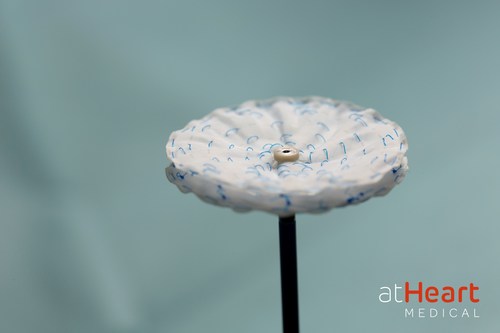First Five Patients Successfully Treated with atHeart Medical's Novel reSept™ Atrial Septal Defect Occluder in U.S. IDE Pivotal Trial
The first occluder with a metal-free, bioresorbable frame for the treatment of patients with clinically significant, isolated ASDs
BAAR, Switzerland and MOUNTAIN VIEW, Calif -- atHeart Medical, a medical device company dedicated to establishing the new standard of care for closure of atrial septal defects (ASD), today announced the successful treatment of the first five patients in its ASCENT ASD U.S. Investigational Device Exemption (IDE) pivotal trial. This study, the company's first in the US, will evaluate the safety and efficacy of the reSept ASD Occluder.

The initial patients were treated by Dr. Thomas Jones, Cardiac Catheterization Laboratory Director at Seattle Children's Hospital (Seattle, WA), Dr. Scott Lim, Medical Director of the Advanced Cardiac Valve Center at the University of Virginia (Charlottesville, VA) and Dr. Thomas Forbes, Director of Cardiac Catheterization Laboratory at Children's Hospital of Michigan (Detroit, MI). The prospective, single-arm study will enroll up to 250 patients at multiple sites globally. Primary endpoints will be compared with established performance goals for previously FDA-approved transcatheter ASD occluders.
"I am pleased to be a part of this study and advance therapy options for septal defects that leave a minimal footprint behind. The reSept ASD Occluder implanted easily and had a successful outcome with no residual shunts," commented Dr. Jones. "We look forward to continuing enrollment and further validation of this promising technology."
Current ASD occluders have metallic frames that can place patients at risk for complications and prohibit future transseptal interventions. Initial clinical experience demonstrates effective closure of the ASDs treated with the company's device.
"The metal-free frame of the reSept ASD Occluder provides a low-profile that over time is replaced by the patient's tissue, leaving minimal implant behind and restoring a more natural septum when compared to current occluder devices," stated Saibal Kar, MD, Interventional Cardiology at the Los Robles Regional Medical Center in Thousand Oaks, California and Co-Principal Investigator of the IDE trial. "This provides a unique opportunity for physicians to effectively address ASDs while being mindful of our patient's potential need for subsequent transseptal procedures."
"I am pleased to have such a strong start to this important pivotal trial and it is incredibly exciting to have the participation of so many leading institutions," said Laurent Grandidier, CEO of atHeart Medical. "I commend the team's diligence to expanding the body of evidence supporting our reSept device and dedication to delivering this lifesaving innovation to patients around the world."
About ASCENT-ASD Investigational Device Exemption (IDE) Trial
A prospective, single-arm, global multi-site clinical investigation study that will enroll a total of up to 250 patients. The study aims to demonstrate the safety and efficacy of the reSept™ ASD Occluder for treating clinically significant secundum ASD with a transcatheter approach as compared to pre-defined performance goals from other commercially available occluder devices.
About atHeart Medical
atHeart Medical is a medical device company with offices in Switzerland and the United States committed to establish a new standard of care for treatment of atrial septal defects (ASD).
About ASD
Commonly described as a "hole in the heart", an ASD is an opening in the septum between the left and right atria. Most ASDs are congenital defects, affecting six in 10,000 births. They can also be the result of a procedure that requires transseptal crossing. A large atrial septal defect can cause extra blood to overfill the lungs and overwork the right side of the heart. If not treated, the right side of the heart eventually enlarges and weakens. The blood pressure in the lungs can also increase, leading to pulmonary hypertension. When ASDs require closure, the current standard of care is to implant a septal occluder with a metallic frame through a minimally invasive procedure.
Sources
atHeart Medical
Comments